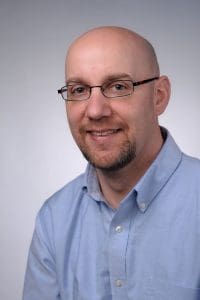 Jim Enwright, G’24, has spent more than two decades leading teams in IT, security, and risk management. But when he enrolled in the iSchool’s Doctorate of Professional Studies (DPS) program, his focus shifted to a different challenge: why so few women pursue degrees in cybersecurity.
Jim Enwright, G’24, has spent more than two decades leading teams in IT, security, and risk management. But when he enrolled in the iSchool’s Doctorate of Professional Studies (DPS) program, his focus shifted to a different challenge: why so few women pursue degrees in cybersecurity.
Enwright, who also teaches at Le Moyne College and serves as a senior adjunct at the iSchool, said on the September 23 episode of Infoversity that his early instinct was to solve the problem outright. Conversations with his committee helped him reframe his approach.
“Instead of trying to solve the problem, let’s understand what the current state is first,” Enwright recalls. “It led me to ask: why do women pursue degrees in cyber in the first place? And what social experiences shape whether they stay?”
The answers surprised him. While he expected the biggest hurdles to come from coursework, his research revealed that community mattered more than academics. Women who found mentors, clubs, or organizations—like Women in Cybersecurity (WiCyS)—were far more likely to persist when faced with challenges.
“Three years ago, I thought I should retool the curriculum,” Enwright said. “Three months ago, I realized I just needed to buy more pizza.”
That focus on belonging carried into his teaching. At Le Moyne, he helped launch a cybersecurity club, a Women in Cybersecurity chapter, and Capture the Flag competitions. A new peer mentoring program is in the works.
Enwright’s thesis had deeply personal roots. His daughter, now studying cybersecurity in Virginia, inspired him to explore ways to make the field more inclusive. A trip with her to a WiCyS conference confirmed the importance of community.
“She ditched me at the capture the flag event to join other women,” he laughed. “But afterward she couldn’t stop talking about how much she loved it.”
The DPS journey wasn’t without sacrifice. Balancing family, teaching, and thesis deadlines meant long nights and weekends filled with writing and data coding. His wife, children, and extended family offered steadfast support—rescheduling vacations, adjusting plans, and encouraging him to persist.
“From day one, I knew my topic. But I don’t think I would have finished if I wasn’t passionate about it,” he said. “Your family has to be all-in, and your cohort helps you see you’re not alone.”
Looking back, Enwright sees the DPS not only as a professional milestone but also as a chance to reframe how he teaches and mentors. His biggest takeaway: in cybersecurity education, fostering community can be just as critical as teaching technical skills.
“Everybody’s journey into cyber is different,” Enwright said. “Once students see the range of possibilities, they can find the part of the field they love—and that’s what keeps them in it.”
